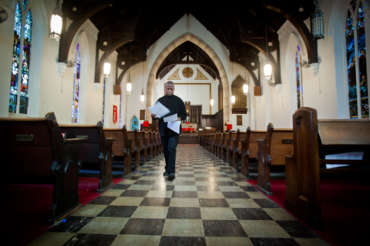On one ordinary Sunday in Detroit’s Island View neighborhood, a very able pastor, regaled in his ecclesiastical vestments, was heatedly preaching to his congregation. There seemed to be an unfortunately inverse relationship between his enthusiasm and the assembly’s. The stronger he delivered his meticulously-crafted sermon, the less interested his parishioners seemed to be.
The church was a storied ancient grey stone building, with bright red heavy doors. The pastor, a certain Barry Randolph: spiritual agitator extraordinaire.
The mood in the sanctuary was flagging and the astute Pastor Randolph sensed it. Hoping to enliven his flock he made a suggestion, asking them to raise their hands. There was a mild rebellion with most of the congregants remaining motionless, genuinely unaffected by the command from Clergy.
Pastor Randolph finishes the story with a practiced rhetorical flourish: “I reached down under my robe and pulled the gun out. Every hand went up!” The sermon that morning was on “Surrender.”
Pastor Barry Randolph has been preaching at The Church of the Messiah for a little more than a decade. He is kinetic; a small man, he exudes a certain energy that projects a clarity of mission. His speech is markedly pastoral in its cadence and oratory style; perfectly enunciated words, intoned with just the right force to drive a good point home. He is what most people would call a character and it is absolutely impossible to leave him unaffected.
Affected is the effect Pastor Randolph wants to have; especially to change the trajectory of younger residents of Detroit.
“There was a mandate God gave me; He told me ‘go get my children’ and I knew that meant young people. And just so you know, I don’t like young people. I don’t like teenagers. I don’t like young adults. I never liked them. It’s never been my forte. With God’s inspiration, I made church simple and relatable. You see the Ass Mass? If I said, ‘I’m going to talk to you about Palm Sunday when Jesus came in Jerusalem,’ ain’t nobody coming to that. But if I say, ‘I’m coming on a donkey,’ people are going to come.”
And so instead of celebrating Palm Sunday, the congregants at Church of the Messiah celebrate an “Ass Mass,” with Pastor Randolph riding into church on a donkey to the amusement of all.
“It is Palm Sunday and I am going to be on a donkey. We tell people to ‘Come AS you are.’ I really want to tell people to bring their ass to church. I brought my ass – even if it’s a little donkey,” Pastor Randolph says in his unvarnished, honest style as he laughs.
There is a purpose to Pastor Randolph’s inspired approach to the Ministry. It is all in the service of teaching and bringing people into a closer cherished spiritual communion, and there are few things he will not do to achieve this.
He half-preaches his other past excursions: “Just so you know for Easter last year I came out of a coffin – and you know the only time you should ever be in a box is when you are dead. So come out of the box! I’ve been a chicken, a ninja, a pimp, a chef and a frog to get the point across. I don’t do it every week and I don’t do it a majority of the time, but to get the point across, I’m willing to do something foolish to make people wiser.”
The sort of sacrifice and passion present in Pastor Randolph’s willingness to devote himself entirely to his congregation, in and out of costume, has resonated deeply with the community.
“When I became the Priest Messiah had 40 members and was on the verge of closing. The building was too big and we had no money. Now the building is too small, we have 300 members, and we are debt-free – that’s the power of God.”
More telling is the demographic shift of the Church; what was a predominantly older congregation has evolved into a vibrant community of younger parishioners. Pastor Randolph says that though the congregation is racially diverse, a little more than half are African American men under thirty years old – a traditionally underrepresented demographic in a lot of faith institutions.
Along with the charismatic leadership of Pastor Randolph are an array of support services the Church makes available to the congregation and community.
“One of the advantages that Messiah has is that we have the resources to help people change their lives. We have a housing corporation to rebuild the neighborhood, a woodshop, and the maker space to teach you about innovation and working with your hands, a commercial kitchen with four independent businesses, a gymnasium for recreation, an urban garden where we grow our own food, a drug treatment program, mentorship programs, a summer camp, and a food pantry. So technically we can house you, feed you, clothe you, educate you, and help you to start your own business or get a job. This is the holistic approach to church. As you can see we’re different.”
As evidenced by the various church ministries, Pastor Randolph, a restaurateur and chef in a previous life, continues to reconcile two experiences that have for a long time been divorced; the spiritual and the material.
He lives in the Church, across the narrow hall from his always-lively office. The informal conversations he has with staff and volunteers are as much homilies as his sometimes-eccentric and richly-messaged sermons are conversational and casual. This is the comfort provided by Pastor Randolph; that the spiritual and phenomenal are inseparable companions.

